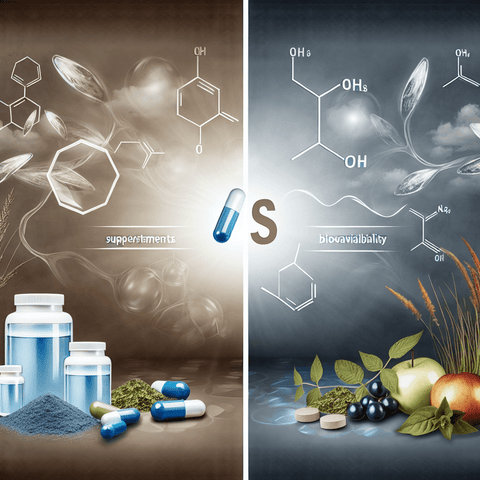Understanding Supplements: Synthetic vs. Natural
In today’s health-conscious world, supplements have become a staple in many people's wellness routines. Yet, the decision between synthetic and natural supplements often leaves consumers puzzled. Before delving into this debate, it’s crucial to understand what each term means. Synthetic supplements are man-made, produced in laboratories using chemical processes, often designed to mimic the natural vitamins and minerals found in food. On the other hand, natural supplements are derived directly from plant or animal sources. The choice between synthetic and natural supplements goes beyond mere preference. It involves considering the bioavailability, efficacy, and potential health impacts. Bioavailability refers to the extent and rate at which the active ingredient or active moiety is absorbed and becomes available at the site of action. Generally, natural supplements are believed to have superior bioavailability compared to synthetic ones. However, it’s essential to note that this can vary depending on the specific nutrient in question. Moreover, the efficacy of a supplement is not solely dependent on its natural or synthetic origins but also on its formulation and the individual's unique health needs. For example, some artificial supplements are formulated to provide a higher concentration of the active ingredient, which can be beneficial in cases of severe deficiency. When exploring options, it’s crucial to evaluate the source of the supplement, manufacturing practices, and whether the product has been tested for safety and efficacy. Reputable brands often provide transparency about their production processes and ingredient sourcing. Links such as Vitamin C supplements can guide you towards quality products that meet these standards.
Benefits and Risks of Synthetic Supplements
Synthetic supplements offer several advantages, primarily in terms of cost and availability. Because they are mass-produced, they tend to be more affordable and accessible than their natural counterparts. Additionally, synthetic supplements can be tailored to provide specific dosages and combinations of nutrients that may not be easily obtainable from natural sources. However, there are potential downsides. Some synthetic supplements may contain artificial additives, fillers, or preservatives that can cause adverse reactions in sensitive individuals. Furthermore, the long-term effects of consuming synthetic supplements are not entirely understood, and some studies suggest that high doses may lead to toxicity or other health issues. To mitigate these risks, it is advisable to choose supplements from reputable brands that adhere to good manufacturing practices. Checking certifications, such as those from the U.S. Pharmacopeia (USP) or the NSF International, can help ensure the quality and safety of the product. For those seeking synthetic options, exploring the Magnesium supplements category can provide insight into trusted manufacturers.
Exploring the Advantages of Natural Supplements
Natural supplements are often favored for their perceived purity and minimal processing. These supplements are typically derived from whole food sources, which may contain a complex matrix of vitamins, minerals, and phytonutrients that work synergistically to enhance absorption and efficacy. One of the primary benefits of natural supplements is their alignment with holistic health approaches. They are considered to be closer to the forms found in nature, which can be advantageous for those seeking to maintain a balanced and integrated diet. Additionally, natural supplements may contain fewer additives, making them a preferable choice for individuals with allergies or sensitivities. Nevertheless, natural supplements are not without drawbacks. They can be more expensive and less potent than synthetic versions. Moreover, the sourcing of natural ingredients is critical; poor agricultural practices can result in products contaminated with pesticides or heavy metals. When choosing natural supplements, it’s vital to consider the source and quality. Brands that prioritize sustainable practices and transparency in their sourcing are often the most reliable. The Vitamin D supplements section can be a starting point to explore naturally sourced options.
Key Factors in Choosing the Right Supplement
When faced with the decision between synthetic and natural supplements, several factors should be considered. These include individual health needs, dietary restrictions, cost, and personal preferences. For individuals with specific health conditions or nutrient deficiencies, the choice of supplement may be guided by medical advice. Consulting with a healthcare provider can help determine the most effective form and dosage necessary to meet your health goals. Cost is another significant factor. While synthetic supplements tend to be less expensive, the overall value should be assessed in terms of quality, effectiveness, and potential health benefits. It’s essential to weigh the immediate cost savings against the possible long-term health implications. Personal values and lifestyle choices also play a role. Some consumers prioritize organic and natural products, while others may seek out vegan or allergen-free supplements. Understanding the labels and certifications can aid in making informed decisions. Ultimately, the choice between synthetic and natural supplements is personal and should be made based on a thorough evaluation of these factors. For further guidance, the Vitamin K supplements page offers insights into different supplement types and their benefits.
Making Informed Decisions: The Role of Research
Research is a cornerstone of making informed decisions about supplements. The supplement industry is vast and not as tightly regulated as pharmaceuticals, making it crucial for consumers to educate themselves. Reading scientific literature, consulting with healthcare professionals, and examining product reviews can provide valuable insights. Reliable sources of information include peer-reviewed journals, government health websites, and established health organizations. Additionally, understanding the regulatory landscape is important. Supplements are regulated differently across regions, and standards for labeling, claims, and safety can vary. In the European Union, for instance, health claims are regulated by the European Food Safety Authority (EFSA), ensuring that any benefits advertised are supported by scientific evidence. It’s also beneficial to stay updated on current research and trends within the industry. Emerging studies can offer new insights into the efficacy and safety of both synthetic and natural supplements. For a comprehensive view, exploring resources like Omega-3 supplements could enhance understanding of their role in a balanced health regimen.
Conclusion
Choosing between synthetic and natural supplements is a nuanced decision that involves understanding the benefits, risks, and personal health needs. While synthetic supplements offer affordability and convenience, natural supplements are often preferred for their purity and holistic approach. Consumers must prioritize quality, efficacy, and safety, and make decisions that align with their health goals and values. By staying informed and consulting with healthcare professionals, individuals can navigate the supplement market effectively and make choices that support their well-being.
Q&A Section
Q: What is the main difference between synthetic and natural supplements?
A: Synthetic supplements are chemically manufactured to mimic natural nutrients, while natural supplements are derived directly from plant or animal sources.
Q: Are natural supplements always better than synthetic ones?
A: Not necessarily. Both have their pros and cons. Natural supplements are often preferred for their purity and synergy with other nutrients, while synthetic ones can offer higher potency and cost-effectiveness.
Q: How can I ensure the supplements I choose are safe?
A: Look for products from reputable brands, check for certifications like USP or NSF, and consult with healthcare professionals. Researching the product and manufacturer can also provide assurance.
Q: Why is bioavailability important in supplements?
A: Bioavailability determines how well a nutrient is absorbed and utilized by the body. Higher bioavailability means more effective supplementation.
Q: What should I consider when choosing a supplement?
A: Consider your specific health needs, dietary restrictions, cost, and personal values. Consulting with a healthcare provider can also guide your decision.
Important Keywords
Supplements, synthetic supplements, natural supplements, bioavailability, efficacy, health benefits, supplement safety, nutritional supplements, cost of supplements, supplement quality, health claims.



